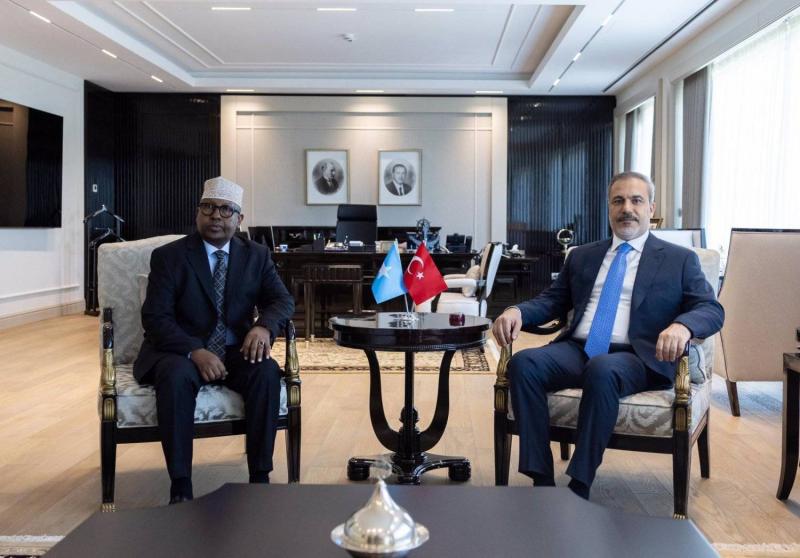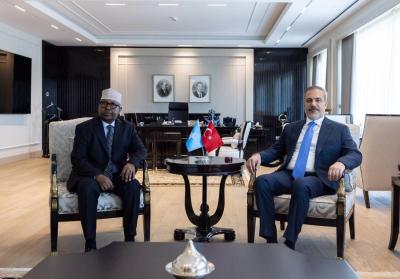A day after a meeting between Egyptian Foreign Minister Dr. Badr Abdel Atty and Somali President Hassan Sheikh Mohamud, during which Cairo reaffirmed its support for "the unity and sovereignty of Somalia," Turkey hosted a tripartite meeting involving Turkey, Somalia, and Ethiopia as the second round of talks aimed at reaching a compromise between Mogadishu and Addis Ababa regarding the establishment of an Ethiopian seaport in the separatist region of "Somaliland." On January 1st, Ethiopia signed a "Memorandum of Understanding" with the unrecognized region of "Somaliland," granting Ethiopia, a landlocked country, the right to establish a commercial port and military base at the entrance of the Red Sea, over a 20-kilometer rental period of 50 years, in exchange for recognizing the region's independence. Somalia rejected the memorandum and President Hassan Sheikh Mohamud signed a law nullifying its contents. The Arab League also supported Mogadishu's stance, describing the memorandum as "void, nullified, and unacceptable."
Egypt expressed a firm rejection of the Ethiopian agreement with "Somaliland" immediately after its signing. Egyptian President Abdel Fattah El-Sisi confirmed, following a meeting with his Somali counterpart last January, that Somalia is an Arab nation and has rights under the Arab League charter to joint defense against any threats. He added that "Cairo will not allow anyone to threaten Somalia or undermine its security," stating: "No one should test Egypt and attempt to threaten its brothers, especially if those brothers have asked for its support."
Moreover, the Egyptian Foreign Minister emphasized during his meeting with the Somali president on the sidelines of Rwandan President Paul Kagame’s inauguration that "his country supports the sovereignty of Somalia and the unity and integrity of its territory," according to an official statement from the Egyptian Foreign Ministry.
Turkey launched a mediation initiative between Somalia and Ethiopia, with the first round held in Ankara on July 2nd, where Turkish Foreign Minister Hakan Fidan met with Ethiopian and Somali counterparts, Tai Atske Selassie and Ahmed Maalim Faqi, respectively. The second round of talks took place on Monday in Ankara with the presence of foreign ministers from the three countries. Before the second round, Ethiopian Prime Minister Abiy Ahmed made a phone call to Turkish President Recep Tayyip Erdoğan, expressing his appreciation for Erdoğan's support in facilitating a resolution to misunderstandings between Ethiopia and Somalia. Abiy Ahmed stressed, according to a statement from the "Ethiopian News Agency," the "importance of providing his country access to the sea through an agreed-upon approach."
Former Egyptian Foreign Minister Ambassador Mohamed al-Arabi stated that "Egypt welcomes any mediation and solution efforts, provided they do not violate the unity and sovereignty of Somalia," noting that "Turkey has good relations with both Somalia and Ethiopia and has a military base in Somalia, which makes it interested in stabilizing the situation between the two countries." Al-Arabi told "Asharq Al-Awsat" that "Ankara seeks to play an active role in resolving the crisis; to safeguard its interests and the stability of the region."
Both the Egyptian and Turkish foreign ministers confirmed during a recent meeting in Cairo their support for the unity and sovereignty of Somalia. However, al-Arabi is not very optimistic about the "success of the Turkish mediation." He said, "Ankara will not be harmed by the presence of an Ethiopian military base in Somaliland," pointing out that the mediation "aims to improve relations between Ethiopia and Somalia."
While former Deputy Foreign Minister Ambassador Mona Omar agrees with al-Arabi that "any mediation efforts between conflicting parties are commendable and welcome," she describes the Turkish mediation as "a waste of time." She clarified that "Ethiopia will not retreat from its position, and in return, Somalia will not accept any violation of its sovereignty over its territory." The former Egyptian diplomat emphasized that "Egypt's position has always been not to infringe upon Somali sovereignty, and if Ethiopia and Somalia agree on maritime access, Egypt will respect the sovereign decisions of the two countries, even if it affects Egyptian national security; because Ethiopia is an untrustworthy state."
Dr. Said Nada, a political science professor at Cairo University, proposed three scenarios regarding Turkish mediation in a report published on the site of the magazine "African Readings" earlier this month. The first scenario suggests that Ankara succeeds in brokering a deal whereby Somalia agrees to facilitate the maritime passage agreement for fair compensation from Ethiopia, with the promise of not recognizing the independence of Somaliland. However, he stated that this "scenario is completely unlikely, as Somalia will not agree to any encroachment on its sovereignty." The second scenario, according to Nada, involves Turkey successfully brokering a deal that grants Somalia a maritime outlet for Ethiopia on the other coasts outside Somaliland's borders, in exchange for a fair deal acceptable to both parties. Nada pointed out "significant difficulties that stand in the way of this potential scenario, including Ethiopia's ability to secure the necessary funding and protection for the project amid economic crises."
The third scenario involves both Ethiopia and Somalia insisting on their positions without reaching a settlement, with the conflict between them worsening without leading to military confrontation, which is "the most likely scenario consistent with the contexts in which both parties to the crisis are situated," according to Nada.




